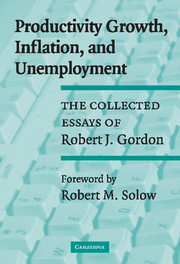Book contents
- Frontmatter
- Contents
- Foreword by Robert M. Solow
- Preface
- Introduction
- PART ONE THE HISTORY, THEORY, AND MEASUREMENT OF PRODUCTIVITY GROWTH
- Part One Introduction
- 1 Does the “New Economy” Measure Up to the Great Inventions of the Past?
- 2 Interpreting the “One Big Wave” in U.S. Long-term Productivity Growth
- 3 The Disappearance of Productivity Change
- 4 The Concept of Capital
- 5 Is There a Tradeoff between Unemployment and Productivity Growth?
- 6 Forward into the Past: Productivity Retrogression in the Electric Generating Industry
- PART TWO INTERPRETING PRODUCTIVITY FLUCTUATIONS OVER THE BUSINESS CYCLE
- PART THREE THE THEORY OF THE INFLATION-UNEMPLOYMENT TRADEOFF
- PART FOUR EMPIRICAL STUDIES OF INFLATION DYNAMICS IN THE UNITED STATES
- Subject Index
- Author Index
- References
Part One - Introduction
Published online by Cambridge University Press: 10 December 2009
- Frontmatter
- Contents
- Foreword by Robert M. Solow
- Preface
- Introduction
- PART ONE THE HISTORY, THEORY, AND MEASUREMENT OF PRODUCTIVITY GROWTH
- Part One Introduction
- 1 Does the “New Economy” Measure Up to the Great Inventions of the Past?
- 2 Interpreting the “One Big Wave” in U.S. Long-term Productivity Growth
- 3 The Disappearance of Productivity Change
- 4 The Concept of Capital
- 5 Is There a Tradeoff between Unemployment and Productivity Growth?
- 6 Forward into the Past: Productivity Retrogression in the Electric Generating Industry
- PART TWO INTERPRETING PRODUCTIVITY FLUCTUATIONS OVER THE BUSINESS CYCLE
- PART THREE THE THEORY OF THE INFLATION-UNEMPLOYMENT TRADEOFF
- PART FOUR EMPIRICAL STUDIES OF INFLATION DYNAMICS IN THE UNITED STATES
- Subject Index
- Author Index
- References
Summary
STUDYING GROWTH AT THE FRONTIER
The gains to human welfare resulting from even minor increases in the rate of economic growth are enormous. In the oft-quoted words of Nobel Prize-winning University of Chicago economist Robert E. Lucas, Jr., “the consequences for human welfare are simply staggering. Once one starts thinking about them, it is hard to think of anything else” (Lucas, 1988, p. 5). Changes in the rate of economic growth in the history of the United States over long intervals have been sufficiently large to create the enormous differences that Lucas was thinking about. A slow growth rate of income per person, say 1 percent per year, causes the standard of living to double in seventy years, roughly every three generations. But a more rapid growth rate, say 3 percent per year, will cause the standard of living to double in a mere twenty-three years, making each generation twice as well off as that of its parents.
The consequences of differences in growth rates are most obvious in comparing rich and poor countries. In the past century, there has been little if any improvement in standards of living in some African countries and among rural populations in some Asian and Latin American nations. Yet the standard of living in the United States, at least as conventionally measured, has increased by a factor of about 8, and that of Japan by a factor of perhaps 25.
- Type
- Chapter
- Information
- Productivity Growth, Inflation, and UnemploymentThe Collected Essays of Robert J. Gordon, pp. 7 - 21Publisher: Cambridge University PressPrint publication year: 2003



